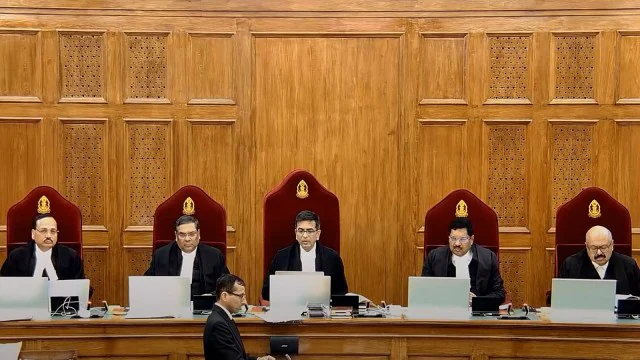This was when the Supreme Court said observations made during the Karnataka High Court proceedings were “unrelated to the course of the proceeding and should have best been eschewed”.
Supreme Court said on Wednesday that calling any region of India “Pakistan” is contrary to the territorial integrity of the nation during its hearing on remarks made by a Karnataka High Court judge earlier this month.
The five-judge panel that is Chief Justice of India D Y Chandrachud said that it was examining the case and decided to take suo motu notice of a series of videos containing remarks delivered by the Karnataka High Court judge. The bench comprising Justices Sanjiv Khanna and B R Gavai Surya Kant, Hrishikesh Roy, and Hrishikesh Roy, seized cognizance in the matter on September 20th and demanded an update from the Registry of the High Court General in relation to the issue.
The court on Wednesday reviewed the report, which said that it was stated that the judge offered an apology to the open public at the beginning of September 21st. “Bearing in mind the apology which has been tendered by the judge of the high court, in the course of the open court proceedings on September 21, 2024, we consider it in the interest of justice and the dignity of the institution to not pursue these proceedings further,” the Supreme Court bench said.
“The report’s text that has been filed to the Registrar General could clearly indicate that the comments made in the hearing in front of the High Court of Karnataka were not related to these proceedings, and ought to have avoided. Justice’s perception for everyone in society is just as important as the actual rendering of justice as a factual matter,” the supreme court ruled.
Additionally Read MUDA investigation: Karnataka Lokayukta to probe charges against CM Siddaramaiah
Additionally, the judge was also able to make “general” observations before closing the hearing. “Video streaming and conferencing” of the proceedings have become an important method of outreach to help courts increase access to justice. But all parties in the process of judicial adjudication, such as judges, lawyers and litigants, in particular those who are present in person should be aware that the remit of the proceedings which take place in a courtroom does not only impact those who are physically present. It can be significant and extends beyond the physical boundaries of where courts are situated. This puts a greater pressure on judges and lawyers and litigants in person, and who conduct their actions aware of the effect that informal observations have on the general public. “
“As judges, we’re aware of the fact that every person is a unique individual with predispositions that have been accumulated through our life experiences regardless of the early ones or those that come later. However it is crucial that each judge be cognizant of the individual personal predispositions. The essence of judging is to be fair and impartial. In the process of judging is the requirement for each judge to recognize their personal predispositions as it is only because of this awareness that we are truly faithful to the primary obligation of a judge to render impartial and fair justice.” stated the bench.
“We stress this fact because it is vital for all those involved in the institution to recognize that the only rules to govern the judicial process are those laid in the Constitution of India. Innocuous observations may reveal a hint of personal prejudice, particularly in cases where they could be perceived as aimed at one particular gender or particular group of people. Judges must therefore be careful not to make comments in court that may be seen as discriminatory or, more generally, harmful to any segment of society. “
In the event that Karnataka High Court Karnataka High Court is not a participant at the trial, the judge stated that it will not add any additional statements, “save and except to express our serious concern about both the reference to gender and to a segment of the community”.
“Such observations could be interpreted as negative and affect not only those in the courts or judges that was making the observation however, the entire judiciary system. Based on this viewpoint… while we’re inclined to close our discussion, we’ve offered these views in the hope and hope that the demands that are imposed on all those associated with the judicial system in the digital age will lead to the necessary changes in behavior at the bench as well as of the bar in the near future. “











